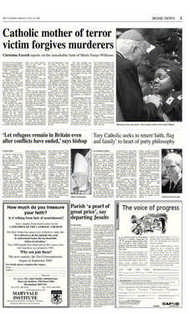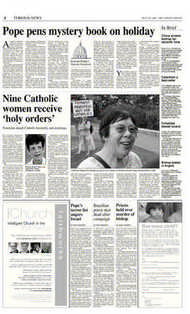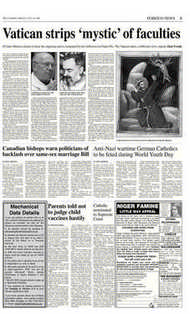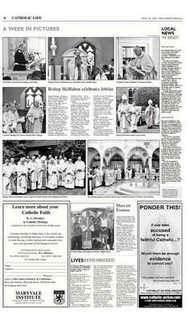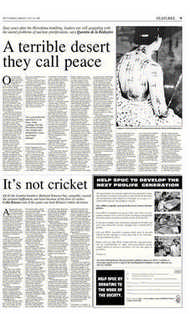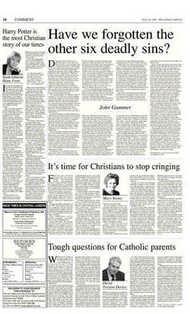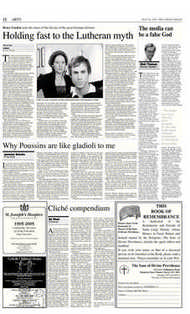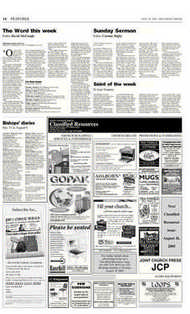Page 7, 29th July 2005
Page 7
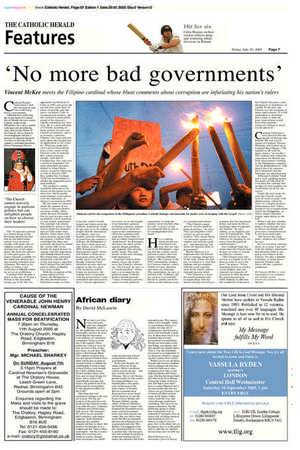
Report an error
Noticed an error on this page?If you've noticed an error in this article please click here to report it.
Tags
Share
Related articles
Shady Business As Usual
Filipino Army Cracks Down In Cebu
Filipinos Say Farewell To Sin
Cardinal Gives Marcos Last Rites
Bishops Call For Filipino Unity
News In Brief
‘No more bad governments
Vincent McKee meets the Filipino cardinal whose blunt comments about corruption are infuriating his nation’s rulers Cardinal Ricardo Vidal doesn’t look like the kind of man who could bring down a government.
Although he is, following the recent death of Cardinal Sin of Manila, the most senior Catholic leader in the Philippines, he is also a gentle, cultivated and self-effacing man. And yet this Prince of the Church, who is fluent in seven languages and has a passion for Spanish literature, is a thorn in the side of his country’s embattled president, Gloria Macapagal-Arroyo.
The 74-year-old cardinal is a potent threat to the President despite the fact that he has been hospitalised twice in recent months with heart and circulation troubles and has osteoporosis in his upper spine. He bears his infirmity with good grace: he makes himself available for this interview despite having recently emerged from treatment. We meet at his office in Cebu, a city south-east of Manila where he serves as archbishop.
Cardinal Vidal became a priest at the age of 25 and a bishop at the unusually young age of 40. He was appointed Archbishop of Cebu in 1981 and given the red hat four years later. In terms of priestly and religious vocations, Cebu is comparatively healthy, and the cardinal is particularly proud of his diocese’s rapidly expanding lay ministry. He is a firm defender of Catholic teaching on birth control, divorce and Church governance, and is, in essence, a patriotic Filipino who cares passionately about the Gospel and its application to his country. What has made him such a powerful political force is his vision of the Church’s role in national life, which contrasts sharply with that of Cardinal Sin. Sin, who was a political kingmaker for more than three decades, helped to bring Gloria Arroyo to power following a coup in January 2001. But, unlike Sin, Cardinal Vidal has not hesitated to rebuke the unpopular president publicly.
The cardinal is understandably reluctant to be drawn on the matter in our interview, but he tacitly acknowledges reservations over the legitimacy of Arroyo’s accession in 2001.
He also hints at concerns about the manner of her victory in the presidential elections of May 2004, when she beat Fernando Poe by just two per cent in an election whose legitimacy was widely questioned. The cardinal was clearly perturbed by Arroyo’s decision to stage her inauguration in Cebu rather than Manila, where there were street protests against ballot-rigging. Cardinal Vidal celebrated the Mass but pointedly declined to attend the victory ball. In his homily he urged Arroyo to engage with the opposition and rebuild national unity. His muted tone contrasted eloquently with the effusively pro-Arroyo speeches that Cardinal Sin had delivered at rallies in Manila four years earlier.
With the exception of the young nation of East Timor, the Philippines is the only predominantly Christian country in Asia. It has the world’s fourth largest and fastest-growing Catholic population. Some 83 per cent of its 85 million people identify themselves as Catholic. And yet, despite vigorous criticism of graft from the country’s bishops, the Philippines is also Asia’s third most corrupt nation, according to a 2004 Transparency International report. Some $10 billion is believed to have gone astray in the public sector over the last decade. Cardinal Vidal identifies poverty and corruption as the two great evils facing his nation. Under his guidance, the bishops have cooperated with the government’s anticorruption and anti-poverty drive. Church representa tives now sit on the boards of government agencies awarding contracts; greater resources have been allocated to the ombudsman’s office for tackling graft; steps have been taken to end so-called congressional “pork-barrel” local budgets, and there has been action against illegal gambling and inquiries into missing public funds. The early results of this new strategy look impressive.
Cardinal Vidal is determined, above all, to preserve the Church’s autonomy. The Church, he says, is a “moral guardian” whose task is to evangelise the political arena. Catholic leaders should promote “values formation and education towards political maturation” to help the country move beyond what he calls “a series of bad governments due in part to an unenlightened electorate”.
He is scathing about the personality-based contests that are typical of the Philippines, arguing that the country needs genuine contests between parties offering different policies. He is proud of the 1987 constitution, drafted by Corazon Aquino, which forbids divorce, abortion and same-sex marriage. The constitution, he says, is imbued with “Catholic values such as love and life”. But he is careful not to be drawn on the delicate issue of constitutional reform.
“The Church cannot actively involve itself in partisan politics,” he says, “but can enlighten voters on how to choose their leaders.” This means being “an advocate against corruption and narcotics politics” and denouncing “all forms of immoral deals in government”.
But he believes it is important that the Church isn’t a constant antagonist of the state. There are matters on which it is vital that bishops and government officials work together, such as the family, education and poverty relief.
“The Church is a force for moral guidance and evangelisation, but any democratically-elected gov ernment also has legitimate duties and must be left to discharge them in appropriate fashion,” he says, adding, in an implicit criticism of Cardinal Sin: “The Church will be far more effective by keeping its distance from the political establishment.” For Cardinal Vidal this means that the Church must be poor in order to remain an effective witness.
“The Church must take service to a higher level, be poor in order to serve the poor,” he argues. “It has enormous power to resolve social iniquity and can channel vast amounts of resources to help the poor. By practising poverty, while helping to alleviate the conditions of the poor, the Church becomes a nonideological re-distributor of wealth. In the past, the Church was the recipient of many endowments. If it had undertaken to distribute those lands to help the poor, land reform would have been partially achieved without so much social upheaval.” Cardinal Vidal has a real affection for the people of Britain and Ireland. He was a good friend of Cardinal Thomas Winning, and looked up to Cardinal Basil Hume. (“He regaled us all with his many stories,” he recalls.) The cardinal also expresses admiration for British and Irish missionaries working in the Philippines, singling out the Redemptorists, with their Cebu City mission, the Columbans and the Salesians for special praise.
Although Cardinal Vidal and I were speaking before the death of John Paul II, even then the cardinal had an idea of what qualities he would look for in his successor.
Under the next pope, he said, the Church would have to come to grips with globalisation, which he views as a largely positive phenomenon that “offers prospects for evangelisation which the Philippines, as Asia’s major Christian nation, must utilise to the full”.
When I ask him whether it matters whether the next pope is from Europe, Asia or Africa, he laughs and gives me a characteristically down-to-earth reply.
“He’ll have the same tasks, whatever his colour,” he says.
As our two-hour meeting draws to a close, I am left with the distinct impression that Ricardo Vidal is not just a wise Prince of the Church, but also a humble Christian, a caring priest, patriotic Filipino and, above all else, a perfect gentleman.
Dr Vincent McKee is visiting professor of comparative politics at the University of Santo Tomas, Manila
blog comments powered by Disqus




